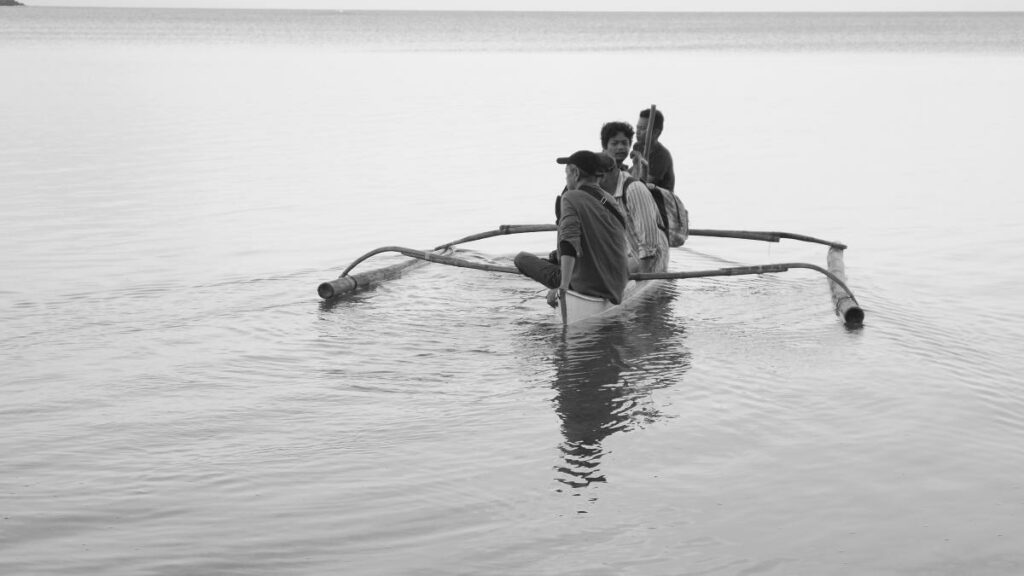By the standards of Filipino auteur Lav Diaz, Genus Pan is a short film, though anything under four hours is short by Diaz’s standards. Genus Pan stands at just over 150 minutes. As per usual, it is in black and white, with a static camera, and an achingly slow pace. Anyone familiar with Diaz’s work will recognise his usual motifs and themes here, yet, partly because it isn’t a six hour slog, and also because it doesn’t require as much knowledge of Filipino history, this is one of his more accessible films.
Genus Pan opens with people singing, not something uncommon in Diaz films. In this opening, we get the usual cloudy skies, dirt roads, and shaking leaves that define Diaz’s depictions of his home country. The plot follows three men, miners who are fed up with money being taken from them. They feel exploited and remain in poverty, while working an unsafe job. So the three embark on a journey, wandering slowly back to their hometown. Apocalypse Now was shot in the forests of the Philippines and so Genus Pan is like Diaz’s version of that perhaps. Men travel down the jungle, trudging through the wilderness, discovering the follies of man along the way.

Set on the fictional Hugaw Island, the film is timeless and has no specified setting, so it could really be set at any time in the recent past, and attempts to analyse timeless concepts such as the animalistic nature of man. Capitalism and greed are specifically shown as a part of that. A few people control all the resources, and money is scarce. Crimes like rape, murder, and robbery go unpunished when the powerful commit them. This is a film of drunk authorities and leaders, in an evil world of corruption, greed, and betrayal. Despite being a fictional island, the leadership are shown to be from the military, which is a crucial nod to Filipino history. The characters also discuss the Spanish, Japanese, and American occupations of the Philippines, with the island directly tied to the infamous Manila-Mexico trade route. This island of myths is tied to history, because all Diaz films derive their philosophies and themes from the rich and complex history of the Philippines.
Despite nods to history though, Genus Pan is Diaz at his most philosophical, as opposed to more directly historical films like From What is Before and A Lullaby to the Sorrowful Mystery. Diaz does place his social concerns for the Filipino people at the forefront, but he digs into more abstract ideas like survival of the fittest. The film’s title is even a reference to the scientific classification of chimpanzees. In the film, a fictional piece of scientific research is said to have discovered that many humans still have the brains of chimpanzees, and only a few have the fully developed, altruistic brains of people like Buddha, Jesus, and Gandhi. Fascists, dictators, and killers are all listed as having the more animalistic thought process, drawing once again on history relevant to the Philippines. Perhaps this is why the characters in Genus Pan are so generally unpleasant. It is as if Diaz sees little good in the world and wonders where man has gone wrong. His three leads represent the working class, coming from the lowest strata of Filipino society. Yet even they succumb to tensions and arguments. Even in casual conversations, they use honorifics to show respect, but they don’t mean it. As they travel, they experience hallucinations and visions. A black horse in a river becomes a key symbol, though its meaning is not explained. Genus Pan becomes abstract, but in a world this dark, it also inevitably becomes a tragedy.

Genus Pan displays Diaz’s formal rigour. His actors are required to act as if on stage, as the camera stays still for minutes at a time. Though there is one notable handheld sequence, used to represent a lie. Otherwise Diaz does not use artifice and so his films are glimpses of truth, even when the narrative is abstract. This does have stylistic restrictions however. The sound mixing is not great, and the violence is all clearly play-fighting. Yet these flaws exist in many Lav Diaz films. He is an auteur always without a budget, and one dedicated to a certain vision, regardless of technical shortcomings. To watch a Diaz film is to immerse yourself in the images and rich ideas, because by many standards they are otherwise amateurish, though Diaz’s cinematography has only improved as the years have passed. Genus Pan is a beautiful black and white nightmare, in contrast to the much lower quality look of Diaz’s 2000s films like Evolution of a Filipino Family and Melancholia. Here there are some amazing images that exist in a clean and crisp HD beauty. Genus Pan still shows the limitations of Diaz’s filmmaking, but those matter less and less with each film he makes.
Genus Pan exists as a niche product. It will appeal to those who admire Diaz and be rejected by many others, despite being a simpler, easier watch than most of his work. Some may dismiss Genus Pan as minor and inconsequential for Diaz, but that doesn’t mean it is any lower in quality. It may not be the most ambitious Lav Diaz film, but it is still impactful and thoughtful.
Genus Pan screened at London Film Festival 11 October 2020.
